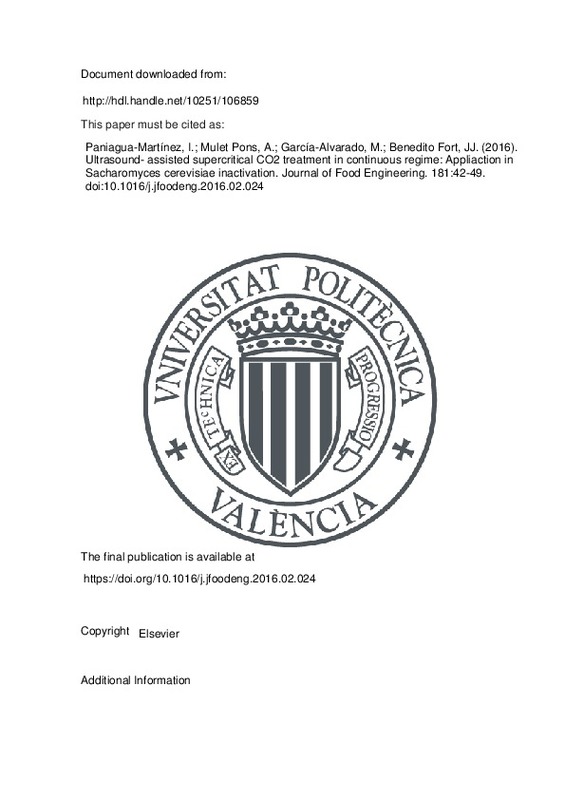JavaScript is disabled for your browser. Some features of this site may not work without it.
Buscar en RiuNet
Listar
Mi cuenta
Estadísticas
Ayuda RiuNet
Admin. UPV
Ultrasound- assisted supercritical CO2 treatment in continuous regime: Appliaction in Sacharomyces cerevisiae inactivation
Mostrar el registro sencillo del ítem
Ficheros en el ítem
| dc.contributor.author | Paniagua-Martínez, Ingrid
|
es_ES |
| dc.contributor.author | Mulet Pons, Antonio
|
es_ES |
| dc.contributor.author | García-Alvarado, M.A.
|
es_ES |
| dc.contributor.author | Benedito Fort, José Javier
|
es_ES |
| dc.date.accessioned | 2018-09-10T09:18:24Z | |
| dc.date.available | 2018-09-10T09:18:24Z | |
| dc.date.issued | 2016 | es_ES |
| dc.identifier.issn | 0260-8774 | es_ES |
| dc.identifier.uri | http://hdl.handle.net/10251/106859 | |
| dc.description.abstract | [EN] Laboratory continuous regime equipment was designed and built for supercritical CO2 microbial inactivation assisted by high power ultrasound (SC-CO2-HPU). Apple juice, previously inoculated with 1-10x107 CFU/ml of Saccharomyces cerevisiae, was treated in the equipment at different juice residence times (3.06-9.2 min), temperatures (31-41 °C) and pressures (100-300 bars). Inactivation ratios were fitted to a hybrid (boolean-real) model in order to study the effect of the process variables. The maximum inactivation achieved by the system was 7.8 log-cycles. The hybrid model demonstrated that HPU has a significant effect on inactivation after shorter residence times. A multi-objective optimization performed with the hybrid model showed that 6.8 log cycles of inactivation could be obtained after a minimum residence time (3.1 min) with HPU application, whereas under the same conditions but without HPU, the inactivation would be 4.3 log-cycles. Therefore, the ultrasound assisted continuous system has shown a great potential for microbial inactivation using SC-CO2 under mild process conditions. | es_ES |
| dc.description.sponsorship | This work was supported by the PROMETEOII\2014\005 project financed by the Generalitat Valenciana (Conselleria d'Educacio, Cultura i Esport, Valencia, Spain). The authors acknowledge the Consejo Nacional de Ciencia y Tecnologia (CONACyT/N. 218273) for the scholarship awarded to PhD Student Paniagua-Martinez, I. The authors especially wish to thank Eng. Ramon Pena for his technical assistance in the development of the equipment. | en_EN |
| dc.language | Inglés | es_ES |
| dc.publisher | Elsevier | es_ES |
| dc.relation.ispartof | Journal of Food Engineering | es_ES |
| dc.rights | Reserva de todos los derechos | es_ES |
| dc.subject | Non-termal process | es_ES |
| dc.subject | Supercritical CO2 | es_ES |
| dc.subject | Ultrasound | es_ES |
| dc.subject | Continuous regime | es_ES |
| dc.subject | Sacharomyces cerevisiae inactivation | es_ES |
| dc.subject.classification | TECNOLOGIA DE ALIMENTOS | es_ES |
| dc.title | Ultrasound- assisted supercritical CO2 treatment in continuous regime: Appliaction in Sacharomyces cerevisiae inactivation | es_ES |
| dc.type | Artículo | es_ES |
| dc.identifier.doi | 10.1016/j.jfoodeng.2016.02.024 | es_ES |
| dc.relation.projectID | info:eu-repo/grantAgreement/GVA//PROMETEOII%2F2014%2F005/ES/Alimentos saludables y competitivos: intensificación de procesos de obtención%2Fpreservación de compuestos bioactivos. Secado e inactivación microbiana/enzimática asistida por ultrasonidos/ | es_ES |
| dc.rights.accessRights | Abierto | es_ES |
| dc.contributor.affiliation | Universitat Politècnica de València. Departamento de Tecnología de Alimentos - Departament de Tecnologia d'Aliments | es_ES |
| dc.description.bibliographicCitation | Paniagua-Martínez, I.; Mulet Pons, A.; García-Alvarado, M.; Benedito Fort, JJ. (2016). Ultrasound- assisted supercritical CO2 treatment in continuous regime: Appliaction in Sacharomyces cerevisiae inactivation. Journal of Food Engineering. 181:42-49. https://doi.org/10.1016/j.jfoodeng.2016.02.024 | es_ES |
| dc.description.accrualMethod | S | es_ES |
| dc.relation.publisherversion | https://doi.org/10.1016/j.jfoodeng.2016.02.024 | es_ES |
| dc.description.upvformatpinicio | 42 | es_ES |
| dc.description.upvformatpfin | 49 | es_ES |
| dc.type.version | info:eu-repo/semantics/publishedVersion | es_ES |
| dc.description.volume | 181 | es_ES |
| dc.relation.pasarela | S\327858 | es_ES |
| dc.contributor.funder | Generalitat Valenciana | es_ES |







![[Cerrado]](/themes/UPV/images/candado.png)

